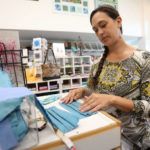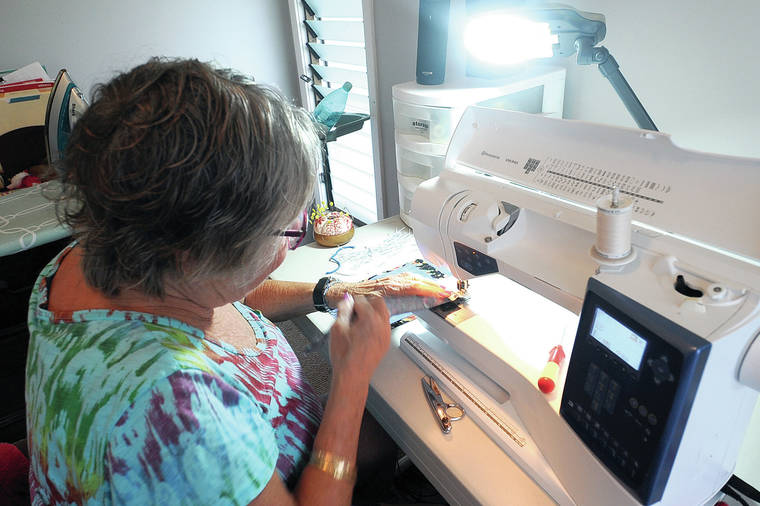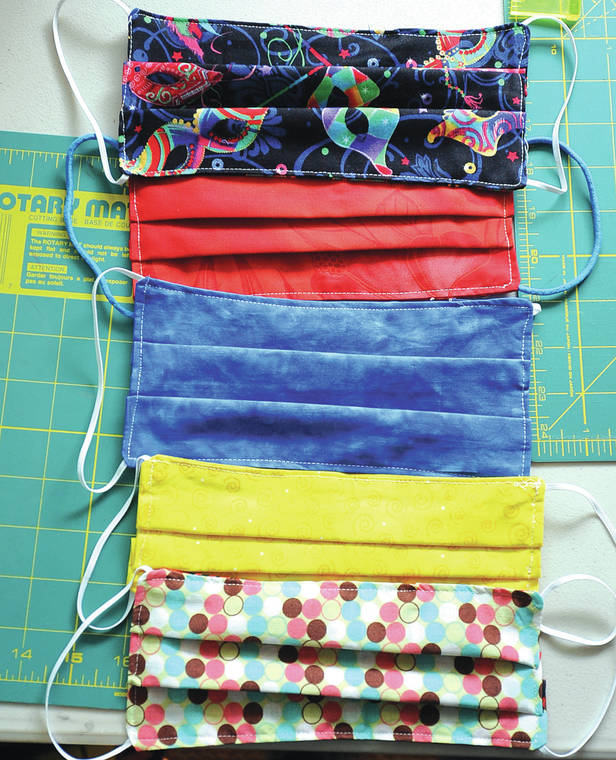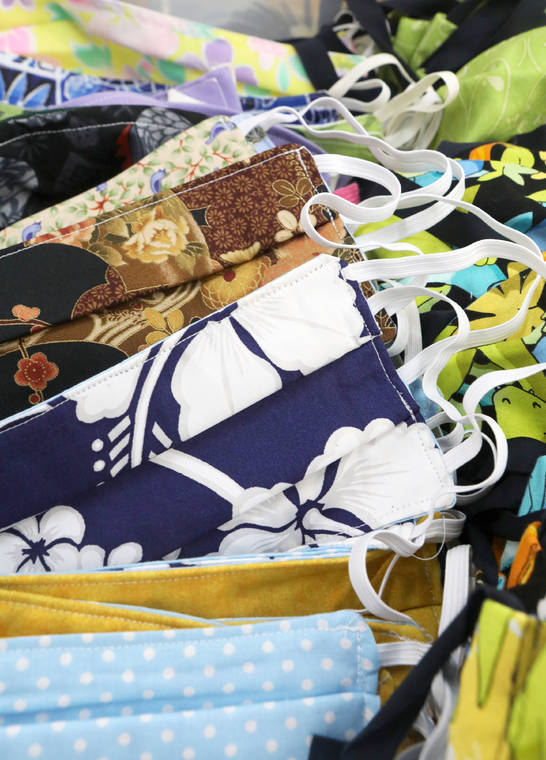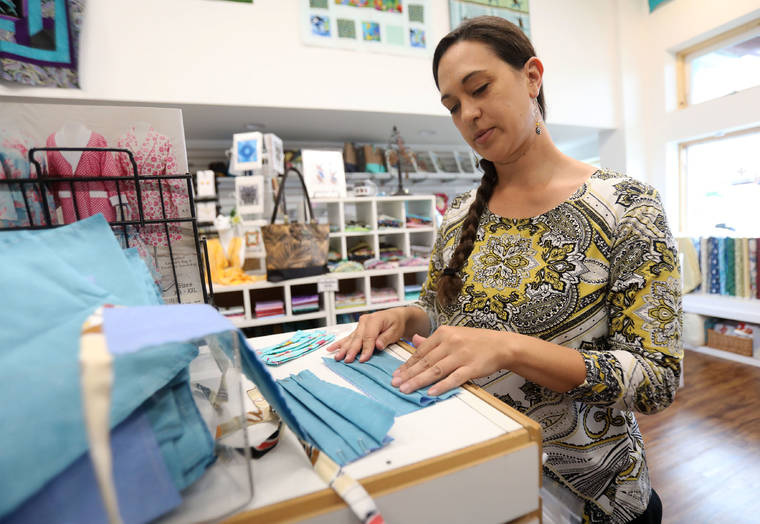Stay calm, and sew on.
So says Bill Miller, president of Discount Fabric Warehouse, which is collecting homemade masks at its stores in Hilo, Kailua-Kona and on Kauai, and distributing them to facilities that have said they need them.
Making cloth masks to help compensate for shortages at local hospitals and care homes is a burgeoning occupation for sewing circles and community huis, especially now that the governor issued a stay-at-home order to reduce casualties from the ongoing COVID-19 pandemic.
It was easy to see there was a need to coordinate to ensure masks made it to the right people, Miller said.
“I think, personally, it’s an awesome project for people to occupy their time,” Miller said. “In a world of crisis, it’s always good to be able to do something, rather than sit around and watch (the) 24-hour news cycle … .”
Sewing is therapeutic for many people, he said, and whatever one’s hobbies are, to be able to “do something positive instead of being wrapped up in the negative” is beneficial.
Patterns, instructions and links to video tutorials can be found at discountfabricwarehouse.com/facemasks.
Linda Brown, who lives near Volcano, has been sewing face masks out of fabric scraps.
Brown, who has a compromised immune system and has been self-isolating, said she saw a report on television about people in Georgia making masks, “and I thought, what the heck, I’ll make them, too.”
She began her work Monday and is planning to make about 1,000 masks. The “cutesy” masks can be worn over personal protective equipment such as N95 masks to help those last longer, Brown said.
Brown, who has been sewing for most of her life, donated on Friday about 50 to Bay Clinic, where she’s been a patient for more than two decades.
“They’ve always been there for me. I’ve known many people that work there,” she said. “It’s important to me to volunteer for stuff because I call it giving back and making a deposit in the karma bank. … This makes me feel terrific to know I’m helping. I don’t need a pat on the back. I want to do it.”
In Paauilo, Jami Sales and her cousin, Marlene Simpson, and other volunteers are working to create washable covers that will snugly fit N95 masks, but they are in need of volunteers to cut out fabric templates.
Sales said fabric and templates will be provided, and those who are interested in helping can meet at any post office between Waimea and Hilo for the materials.
To volunteer or donate to the effort, email Sales at jamialoha@gmail.com.
Some quilting and sewing group members have stepped up to sew.
“If we give them the cut patterns and ties, then they can go ahead and construct the masks,” Sales said.
Once the constructed masks are returned, Sales said they are laundered one final time, then only handled with gloves and placed into plastic bags that are then sealed and will be delivered to facilities that have requested them.
“Everybody needs to do everything we can for this,” she said.
The second her cousin had heard about similar efforts on the news, Sales said, “we swung into action,” and work began within two hours.
“It was just a no-brainer,” she said of the effort. “We wanted to do anything we could to do to help.”
Judy Alderson of Kailua-Kona has organized a group of four who are stitching up masks for hospice nurses and families of people in hospice care.
“I want the public to know it is not just the virus,” Alderson said. “We have a community that needs help, especially when medical supplies as simple as a mask will be hard to find. Under (the stay-at-home order) you can be busy.”
Even Kona Councilwoman Rebecca Villegas has gotten into the act.
She told Lt. Gov. Josh Green, a Big Island physician, that she’s tried her hand at mask-making in order to help others during the crisis. The bonus, she said during a Wednesday County Council meeting, is it makes her feel that she’s taking proactive steps — she’s doing something about the virus — and that calms her down.
Villegas said a number of huis have started the “war” effort, and some have even made masks out of bras.
“I’m not going to make any comments about bras or my support of bras,” Green quipped.
Green said he’s not sure how much filtration a cloth mask offers, but “anything is better than nothing,” especially with the severe shortage being experienced in health-care facilities.
Cloth surgical masks worn by hospital staff help keep the virus from being breathed out, compared to N95 masks, designed with filters to keep 95% of particles from coming in. A cloth surgical mask would be more like an N30, Green said.
Green said hospitals can irradiate donated cloth masks to sterilize them.
“It’s very good people are doing this,” Green said. “It gives folks a sense of purpose … and it relieves stress.”
Dani Burger and her husband, Craig, a pediatric hospitalist at Hilo Medical Center, have been coordinating community efforts to provide a variety of masks, including fabric masks, N95 cover masks, and surgical-style masks using “blue wrap” material from the hospital that was originally used to wrap sterilized equipment at the hospital.
Craig Burger said the material is something that is never in contact with patients, and the wrap is typically removed and discarded.
Sew Da Kine and Kilauea Kreations will use this material to make 2,400 masks.
Kathy Tripp, owner of Kilauea Kreations, which has locations in Hilo and Volcano, said her store is providing the materials for the straps, and the masks are being sewn by Sew Da Kine.
During times like this, “our human nature kicks in,” Tripp said. “If we can do something to help, it really helps us cope. We feel better about being able to be in action, especially in times when we’re in nonaction.”
The Burgers said they also are working with the University of Hawaii at Hilo Art Department to 3D print a mask with a filter to provide protection to personnel working directly with COVID-19 patients.
Craig Burger said the idea with the 3D printing is to make a smaller interface with a valve setting and use filter material, like a portion of an N95 mask or another commercial grade material, to just fit the valve.
The first prototype was being printed Thursday.
There has been a deluge of offers to make masks for Hilo Medical Center. But hospital spokeswoman Elena Cabatu said although the offers are heartwarming, such masks are not on the list of supplies HMC is asking the community to donate.
HMC is seeking donations of N95 and surgical masks, face shields, safety goggles, gowns, Tyvek suits and nitrile gloves in original and unopened packaging, and new or gently worn scrubs.
“Currently, our official stance is that Hilo Medical Center will only issue our staff medical grade, certified (personal protection equipment) until our supplies are completely depleted,” she continued. “The same stance applies to face shields and other supplies produced with a 3D printer.
“Again, we hope we are never in a position in which we don’t have certified medical grade personal protection equipment, but if we ever are in that position, it is comforting to know that members of our community are ready and willing to put forth the effort to help with such generosity and spirit of aloha.”
While some hospital staff members may don homemade masks, Cabatu said earlier in the week that “as long as the patient care doesn’t require using a medical grade mask, we’re allowing it.” she said.
The Kona Ambulatory Surgery Center and Kona Community Hospital also are seeking surgical masks and N95 respirators in original, unopened packaging to augment supplies at KCH, should additional supplies be needed.
Donations will be accepted from 7 a.m.-4 p.m., Monday-Friday. Kona Ambulatory Surgery Center, 75-5905 Walua Road, Suite 4 in Kailua-Kona.
Queen’s North Hawaii Community Hospital in Waimea also is seeking donations to supplement the hospital’s supplies, but has asked community members with the skills to do so to sew face masks.
The hospital’s supplies are adequate, and the hand-sewn masks would only be used if supplies are completely depleted, which is not anticipated, NHCH said in a news release.
Hospital spokeswoman Lynn Scully said NHCH has received several hundred commercial and homemade masks since the call went out earlier this week, “and we know more is coming, because we’ve talked to lots of people and groups who are busy sewing.”
Scully said more are anticipated to arrive next week.
It’s “amazing to see such a positive response from the community,” she said, and in talking to those who have donated or are planning to, it “makes them feel good to be part of the team. It’s great.”
According to the U.S. Centers for Disease Control and Prevention, medical providers can use homemade masks, like a bandana or scarf, for the care of patients with COVID-19 as a last resort, but such masks are not considered personal protective equipment since the capability to protect health care workers is unknown.
“Homemade masks should ideally be used in combination with a face shield that covers the entire front … and sides of the face,” the CDC states.
Email Stephanie Salmons at ssalmons@hawaiitribune-herald.com.
Email Nancy Cook Lauer at ncook-lauer@westhawaiitoday.com.



